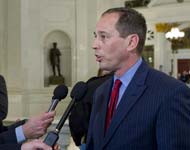Group Says Scarnati’s Shale Tax Bill an Evil for Rural Communities
 A majority of Pennsylvania voters believe the gas industry should be subjected to a tax, and because of this many voters were delighted to hear Senator Joe Scarnati had introduced legislation that would effectively implement such a tax.
A majority of Pennsylvania voters believe the gas industry should be subjected to a tax, and because of this many voters were delighted to hear Senator Joe Scarnati had introduced legislation that would effectively implement such a tax.
But not so fast.
Industry watchdog groups say the bill is pure ‘evil’, aimed at the heart of rural communities – where the vast majority of drilling is likely to take place.
The following is from the Responsible Drilling Alliance’s newsletter, and details why Scarnati’s bill is detrimental to the public, yet a blessing to the gas industry.
—-
 State Senator Joseph “Super Bowl” Scarnati, along with Senator Eugene Yaw, among others, introduced Senate Bill 1100 (SB1100) last week. The bill, “An Act Amending Title 58 (Oil and Gas) of the Pennsylvania Consolidated Statutes,” imposes a natural gas impact fee tied to a model zoning ordinance.
State Senator Joseph “Super Bowl” Scarnati, along with Senator Eugene Yaw, among others, introduced Senate Bill 1100 (SB1100) last week. The bill, “An Act Amending Title 58 (Oil and Gas) of the Pennsylvania Consolidated Statutes,” imposes a natural gas impact fee tied to a model zoning ordinance.
Details of the bill were quickly dissected by watchdog groups around the state. Thanks go to all for exposing its evils and inspiring Pennsylvanians to fight the bill. Some “lowlights” from Dick Martin (PA Forest Coalition): “The Municipal ordinances must: (1) make oil and gas development a permitted use by right in all districts except residential districts, (2) make compressor stations a permitted use by right in agricultural, industrial and commercial districts, and a conditional use in other districts, and (3) make natural gas processing plants a permitted use by right in industrial districts and a conditional use or special exception in agricultural districts.”
Dick goes on to say, “Municipalities that enact ‘more stringent standards’ would be disqualified from receiving Impact Fee dollars. If they don’t swallow that Poison Pill, they repair their bridges, roads and other damage caused by gas drilling on their own. Some of these townships are 100 square miles and have 230 residents. The model ordinance would have a chilling effect. Cash-strapped municipalities would be reluctant to protect public water supplies and valuable natural resources, prohibit drilling in floodplains, prohibiting water withdrawal sites in residential neighborhoods, require setbacks for gathering pipelines or adopt setbacks for wells from features not mentioned in the Oil and Gas Act. The presence of any ‘more stringent’ standards in a local ordinance could render the municipality ineligible for all impact fee revenue.”
If they don’t swallow that Poison Pill, they repair their bridges, roads and other damage caused by gas drilling on their own.
The merits of an impact fee are well worth discussing, but SB1100’s model ordinance provision makes it a non-starter. There are many rural municipalities that lack any zoning and whose residents could benefit from a good model ordinance, but this approach is exactly the opposite of what is needed. A decent model ordinance that serves as a baseline protection for all would be a good place to start, but only if municipalities were allowed to strengthen it, in ways courts have allowed, and not be bribed into not going beyond it.
Please contact your State Senator and members of the Environmental Resources and Energy Committee (EREC) to tell them you oppose SB1100 before it slips into law.
EREC Committee Chairperson, Senator Mary Jo White: mwhite@pasen.gov or (814)437-5289
23rd District Senator Eugene Yaw: gyaw@pasen.gov (570)322-6457 or (717)772-0575
